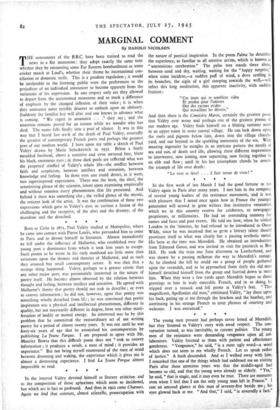Born at Cette in 1871, Paul Valery studied at Montpelier,
where he came into contact with Pierre Lout's, who persuaded him to come to Paris and to devote himself to literature. Almost immediately he fell under the influence of Mallarme, who established over the young poet a dominance from which it took him years to escape. Such poems as he wrote in his early manhood are little more than variations upon the themes and theories of Mallarme, and as such they aroused but small contemporary notice. It was then that a strange thing happened. Valery, perhaps to a greater extent than any other major poet, was passionately interested in the nature of poetry itself. He became almost obsessed by the relation between thought and feeling, between intellect and sensation. He agreed with Mallarme's theory that poetry should not seek to describe ; or even to convey information ; he did not, however, agree that poetry was something wholly detached from life ; he was convinced that poetic inspiration was a physical and intellectual phenomenon, different in quality, but not necessarily different in degree, from any other mani- festation of bodily or mental energy. So interested was he by this problem that he committed the extraordinary act of not writing poetry for a period of almost twenty years. It was not until he was forty-six years of age that he astonished his contemporaries by publishing La Jeune Parque. I am prepared to agree with Mr. Maurice Bowra that this difficult poem does not " seek to convey information ; it produces a result, a state of mind ; it provides an experience." But not being myself enamoured of the state of mind between dreaming and waking, the experience which it gives me is almost a distressing experience. I find La Jeune Parque almost impossible to read.
* * * *


























 Previous page
Previous page